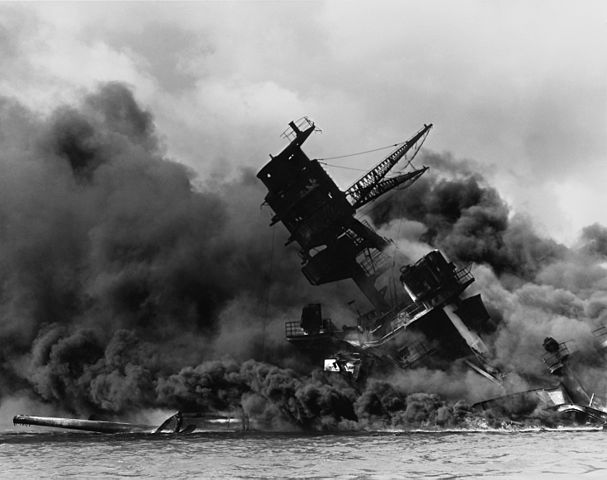There is always much to learn from quotes and their historical significance. Read on for a collection of quotes and general history from December 1st – 7th.

December 1, 1955
“People always say that I didn’t give up my seat because I was tired, but that isn’t true. I was not tired physically… No, the only tired I was, was tired of giving in.”
– Rosa Parks
On December 1, 1955, Rosa Parks refused to give up her seat to a white passenger on a bus in Montgomery, Alabama. Although she was seated in the colored section, the whites-only section was full leading the bus driver to request she move. She was arrested for civil disobedience in violation of Alabama segregation laws resulting in the Browder v. Gayle lawsuit, which she won, and inspiring the black community to boycott the Montgomery buses for over a year. Parks’ act of defiance made her an icon in the civil rights movement! She was the first woman to lie in honor in the Capitol Rotunda in Washington, D.C., following her death in 2005.

December 2, 1823
“The occasion has been judged proper for asserting, as a principle in which the rights and interests of the United States are involved, that the American continents, by the free and independent condition which they have assumed and maintain, are henceforth not to be considered as subjects for future colonization by any European powers.”
– The Monroe Doctrine
The Monroe Doctrine was issued by the United States on December 2, 1823, opposing European colonialism in the Americas. Although written predominantly by then-Secretary of State and future-President John Quincy Adams, the policy became known as the “Monroe Doctrine” beginning in 1850 after President James Monroe who introduced it. At the time it was issued, nearly all Latin American colonies had achieved independence from Europe and the U.S. sought to establish undisturbed influence in the region and avoid the New World becoming a battleground for the Old World powers. The impact of the Monroe Doctrine on the foreign policy of the United States has persisted for nearly two centuries being invoked by many politicians including U.S. Presidents Ulysses S. Grant, Theodore Roosevelt, John F. Kennedy, Ronald Reagan, and Donald Trump.
December 3, 1989
“The world is leaving one epoch and entering another. We are at the beginning of a long road to a lasting, peaceful era. The threat of force, mistrust, psychological and ideological struggle should all be things of the past. I assured the President of the United States that I will never start a hot war against the USA.”
– Soviet General Secretary Mikhail Gorbachev
“We can realize a lasting peace and transform the East-West relationship to one of enduring co-operation. That is the future that Chairman Gorbachev and I began right here in Malta.”
– President George H. W. Bush
On December 3, 1989, U.S. President George H. W. Bush and Soviet General Secretary Mikhail Gorbachev declared the Cold War over in a joint press conference at the Malta Summit. The island nation of Malta was chosen for the Summit due to its strategic location in the center of the Mediterranean Sea. It had previously served as the location for the Malta Conference between FDR and Winston Churchill in 1945. Unfortunately, most of the meetings took place on naval vessels and stormy weather in the area led the Summit to be nicknamed the “Seasick Summit”.
December 4, 1619
“The day of our ships arrival at the place assigned … in the land of Virginia shall be yearly and perpetually kept holy as a day of thanksgiving to Almighty God.”
– Berkeley Hundred Charter
On December 4, 1619, 38 English settlers celebrated their arrival at Berkeley Hundred in Charles City County, Virginia in what is often considered the first Thanksgiving in the United States. The settlers’ charter from the London Company specifically designated the day of arrival to be held as a day of Thanksgiving. This celebration occurred slightly over two years prior to the Pilgrims arrival at Plymouth, Massachusetts aboard the Mayflower in 1621.
December 5, 1945
“Both of my compasses are out, and I am trying to find Fort Lauderdale, Florida. I am over land but it’s broken. I am sure I’m in the Keys but I don’t know how far down and I don’t know how to get to Fort Lauderdale.”
– United States Navy Lieutenant Charles Carroll Taylor
On December 5, 1945, a group of five Grumman TBM Avenger torpedo bombers, designated Flight 19, disappeared over the Bermuda Triangle. The flight was an overwater navigation training exercise out of Naval Air Station Fort Lauderdale, Florida. The flight leader, U.S. Navy Lieutenant Charles Carroll Taylor, had over 2,500 flying hours while the trainee pilots each had around 300. When the planes compasses stopped working, likely somewhere over the Bahamas, Taylor mistakenly believed they were over the Florida Keys and led the group northeast, further out to sea, rather than west, back toward the mainland. All 14 airmen on the flight were lost, along with 13 crew members of a search plane that exploded shortly into rescue efforts. Navy investigators never determined the exact cause of the disappearance and none of the five planes have ever been found.
December 6, 1865
“Neither slavery nor involuntary servitude, except as a punishment for crime whereof the party shall have been duly convicted, shall exist within the United States, or any place subject to their jurisdiction.”
– Thirteenth Amendment to the United States Constitution
The Thirteenth Amendment to the United States Constitution was ratified on December 6, 1865, abolishing slavery and involuntary servitude, except as punishment for a crime. The amendment was passed by the Senate in April 1864 but faced much more opposition in the House, finally passing in January 1865. The political maneuvering required by President Abraham Lincoln’s administration to secure votes led Representative Thaddeus Stevens to comment that “the greatest measure of the nineteenth century was passed by corruption aided and abetted by the purest man in America”. After passage in Congress, the amendment spent much of 1865 being ratified by the states. Georgia became the 27th of the then 36 states to ratify on December 6th, giving the amendment the required three-fourths majority.
December 7, 1941
“To have the United States at our side was to me the greatest joy. Now at this very moment, I knew the United States was in the war, up to the neck and into the death. So we had won after all!…Hitler’s fate was sealed. Mussolini’s fate was sealed. As for the Japanese, they would be ground to powder.”
– British Prime Minister Winston Churchill following the Japanese attack on Pearl Harbor
On the morning of Sunday, December 7, 1941, the U.S. naval base at Pearl Harbor was attacked by the Imperial Japanese Navy Air Service in a surprise preemptive military strike. Japan aimed to cripple the U.S. Pacific Fleet to prevent interference in their plans to capture overseas territories of the U.S. and the U.K. in Southeast Asia. In fact, coordinated Japanese attacks began on U.S. territory in the Philippines, Guam, and Wake Island and on the British Empire in Malaya, Singapore, and Hong Kong that same day. Most of the ships in the harbor were damaged or sunk in addition to 188 U.S. aircraft destroyed and 2,403 dead. The next day, December 8th, Congress declared war on Japan, officially entering the United States into World War II.

In case you missed last week’s quotes, see History November 24th – 30th.
To never miss a Quill Quotes post, please subscribe via email and/or follow us on social media!
Leave a Reply